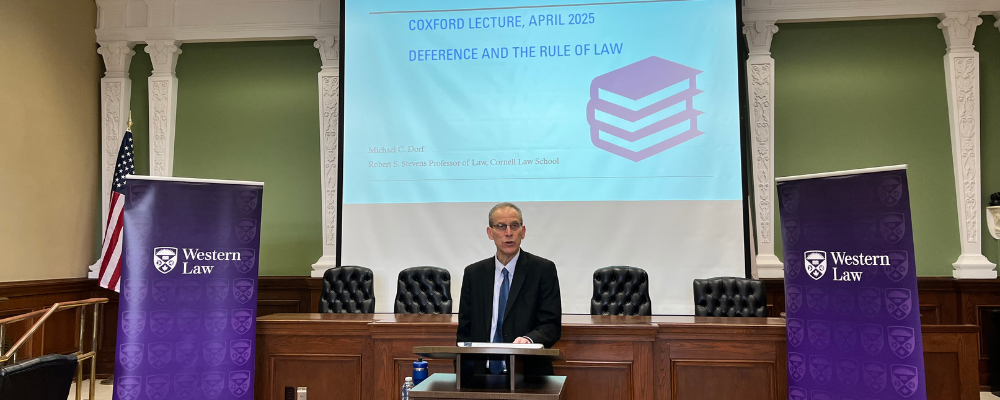Professor Michael Dorf makes case for judicial deference at 2025 Coxford Lecture
July 15, 2025

The shifting role of the courts in the United States in reviewing the decisions of administrative agencies was the focus of the 2025 Coxford Lecture, which was delivered by Professor Michael Dorf, the Robert S. Stevens Professor of Law at Cornell Law School. In a talk entitled “Deference and the Rule of Law,” Dorf focused on the importance of judicial deference to administrative agencies – a topic that has long been debated by the courts and scholars in both Canada and the United States.
“As we wrap our minds around what is happening in the United States in recent weeks, it is important that the health of the rule of law and constitutionalism in that country be top of mind,” said Professor Wade Wright, co-director of the Coxford Lecture in his opening remarks. “It is for that reason that this is a particularly important moment for us to hear from a leading constitutional law scholar in the United States.”
Professor Dorf’s lecture criticized the landmark 2024 decision of the United States Supreme Court in Loper Bright Enterprises v. Raimondo. In this case, the Court overturned the doctrine of Chevron deference, “a long-standing practice under which United States courts deferred to reasonable agency determinations of unclear statutes” Dorf used this case as a starting point for his exploration of the relationship between judicial deference to administrative agencies and the rule of law.
“My claim is that deference to the judgment of others is consistent with the law declaration function, indeed often essential to it. I'll argue that deference to the normative views of other legal actors should not be deemed merely legally permissible, but absent countervailing considerations preferred,” said Dorf.
“The very essence of the rule of law,” argued Dorf, “is the willingness of actors, including…judges in doing their job of deciding cases, to subordinate their own judgment to an external authority.”
Dorf acknowledged that while it may seem counterintuitive to advocate for judicial deference given the recent actions of administrative agencies under the Trump administration, this concern misunderstands the actions of the Trump administration. He argued that the Loper Bright ruling was based on a “badly mistaken understanding of the rule of law,” and that restoring deference to administrative agencies would not give a pass to the Trump administration, since its actions involve executive overreach that is antithetical to the rule of law, and would be unlawful even if Chevron deference still applied.
“I believe deeply that the factors that have contributed to the crisis in the rule of law and constitutionalism in the United States can be found here in Canada as well,” Professor Wright remarked as he closed the lecture. “It's imperative for all of us, faculty and students, to redouble our efforts to shore up the institutions and principles that are the foundation of our system of government and our shared prosperity.”
The Coxford Lecture is generously funded by Western Law graduate Stephen R. Coxford, LLB ’77. Each year, the lecture series brings leading legal thinkers to Western Law to address pressing issues related to the rule of law.






